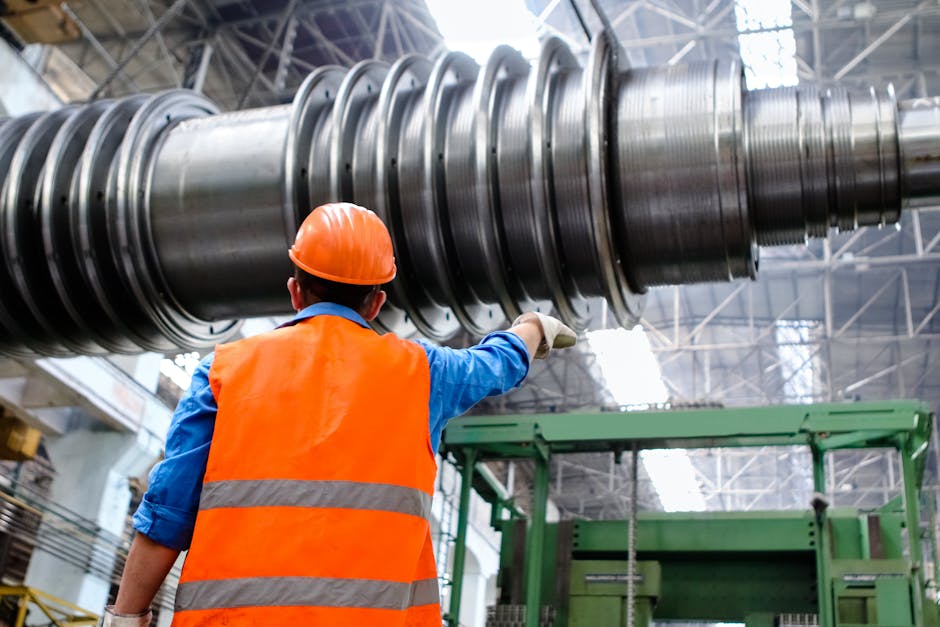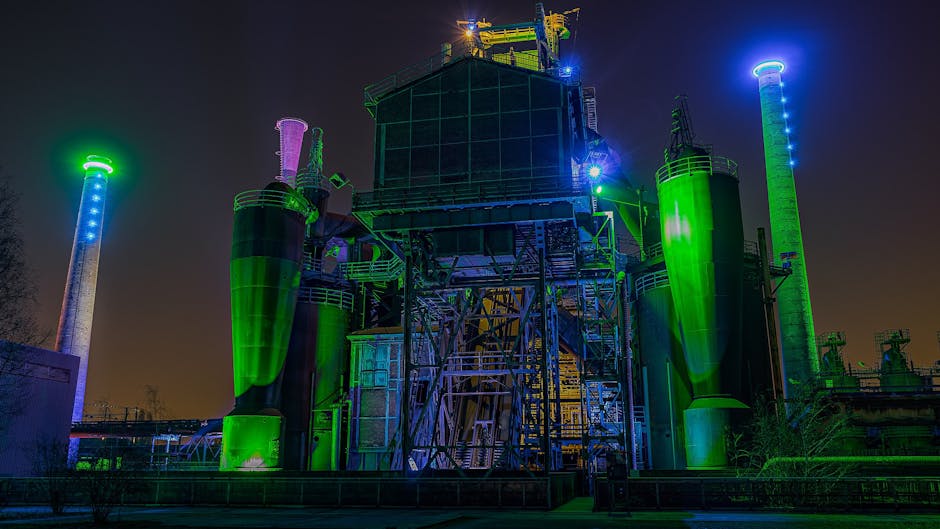Yorkshire’s Industrial Landscape: Tradition and Modern Manufacturing Collide
Yorkshire’s industrial landscape is a rich tapestry of tradition and modernity, where centuries-old manufacturing practises intersect with cutting-edge technology. This juxtaposition of traditional craftsmanship and contemporary innovation has shaped the region’s industrial heritage, creating a dynamic and diverse manufacturing sector.
From its historical roots in textile production and mining to its current prominence in advanced engineering and aerospace, Yorkshire’s industrial landscape encapsulates the evolution of manufacturing techniques and the enduring legacy of ikonic industrial landmarks.
The region’s skilled workforce and commitment to innovation have propelled its economic contributions and positioned it as a hub for future prospects. This exploration delves into the intricate interplay between tradition and modern manufacturing, shedding light on Yorkshire’s industrial prowess.
Key Takeaways
- Yorkshire played a pivotal role in the industrial revolution and its industrial heritage is deeply intertwined with manufacturing innovation and traditional craftsmanship.
- The evolution of manufacturing techniques in Yorkshire has led to increased economic growth, community development, and new employment opportunities.
- Technological advancements such as automation, 3D printing, robotics, and artificial intelligence have revolutionised Yorkshire’s manufacturing sector, improving productivity, efficiency, and product quality.
- Yorkshire’s industrial landscape is not only rich in historical landmarks representing its industrial heritage but also at the forefront of modern manufacturing practises influenced by technology.
Historical Roots of Yorkshire’s Industry

While Yorkshire’s industrial landscape has evolved over the centuries, its historical roots can be traced back to the early developments of mining, textiles, and agriculture in the region. Yorkshire played a pivotal role in the industrial revolution, particularly in the textile industry evolution. The area’s industrial heritage is rich and deeply intertwined with manufacturing innovation and traditional craftsmanship.
The impact of the industrial revolution on Yorkshire was profound, driving economic growth and creating a demand for skilled labour to uphold its manufacturing tradition. However, this period also brought modernisation challenges as traditional methods were replaced by mechanisation. Nonetheless, the historical significance of Yorkshire’s industrial past cannot be overstated, shaping its identity and laying the groundwork for its industrial future prospects.
Transitioning into the subsequent section about the ‘evolution of manufacturing techniques’, it is crucial to understand how Yorkshire’s historical roots have set the stage for the advancements and changes in manufacturing processes that have taken place over time.
Evolution of Manufacturing Techniques

The evolution of manufacturing techniques in Yorkshire encapsulates the ongoing tension between traditional and modern methods. This intersection has significant implications for the local economy, as it influences job opportunities, skills required, and the overall competitive landscape.
Moreover, the technological advancements in manufacturing have reshaped the industry, paving the way for increased efficiency, precision, and innovation.
Traditional Vs Modern Methods
Amidst Yorkshire’s industrial landscape, the evolution of manufacturing techniques is evident as traditional methods intersect with modern innovations. This convergence presents a dynamic juxtaposition, where traditional techniques coexist with state-of-the-art modern machinery, creating a unique manufacturing ecosystem.
-
Preservation of Craftsmanship: Yorkshire’s manufacturing sector cherishes its heritage by preserving traditional techniques such as hand-crafting and artisanal skills, ensuring the continuity of time-honoured practises.
-
Integration of Automation: Modern manufacturing in Yorkshire embraces technological advancements, integrating automated processes and precision engineering to enhance productivity and efficiency, leading to cost-effective production methods.
-
Adaptation to Industry 4.0: Yorkshire’s manufacturing sector is progressively adopting Industry 4.0 principles, incorporating digital technologies like IoT and AI to optimise manufacturing processes, ultimately bridging the gap between tradition and modernity.
Impact on Local Economy
The evolution of manufacturing techniques in Yorkshire’s industrial landscape has significantly impacted the local economy. Modern manufacturing methods have led to increased economic growth and community development in the region.
The adoption of advanced technologies and streamlined processes has enhanced productivity, reduced production costs, and improved the quality of goods produced in Yorkshire. This has not only bolstered the competitiveness of local businesses but has also attracted external investments, fostering a more vibrant economic ecosystem.
Moreover, the shift towards modern manufacturing practises has created new employment opportunities, contributing to a more robust and diverse workforce.
Technological Advancements in Manufacturing
Advancing beyond traditional methods, Yorkshire’s industrial landscape has undergone a technological revolution in manufacturing, with cutting-edge techniques reshaping the production processes and driving unprecedented efficiency and innovation.
-
Automation in Factories: Yorkshire’s manufacturing sector has embraced automation to streamline production lines, reduce costs, and enhance productivity. By integrating advanced robotics and artificial intelligence, factories are achieving higher levels of precision and output while minimising human error.
-
3D Printing Revolution: Additive manufacturing, particularly 3D printing, has revolutionised the production capabilities in Yorkshire. This technology enables the creation of complex and customised parts with greater speed and efficiency, leading to significant advancements in prototyping, customisation, and small-batch production.
-
Advanced Materials and Processes: Yorkshire’s manufacturers are increasingly adopting innovative materials and processes, such as advanced composites and sustainable manufacturing practises, to improve product quality, durability, and environmental sustainability. These developments are reshaping the region’s industrial landscape, positioning it at the forefront of modern manufacturing.
Ikonic Industrial Landmarks

Yorkshire boasts a total of 27 ikonic industrial landmarks, each representing a pivotal aspect of the region’s industrial heritage. These landmarks stand as a testament to Yorkshire’s pivotal role in the Industrial Revolution and its rich architectural heritage. Below is a representation of some of Yorkshire’s most renowned industrial landmarks:
| Landmark | Location |
|---|---|
| Salts Mill | Saltaire |
| Kirkstall Abbey | Leeds |
| National Coal Mining Museum | Wakefield |
| Piece Hall | Halifax |
These landmarks not only serve as historical sites but also as educational resources, attracting visitors from around the world. The architectural grandeur and historical significance of these landmarks offer a glimpse into Yorkshire’s industrial past, fostering an understanding and appreciation for the region’s contribution to industrialisation. As we explore these ikonic landmarks, it becomes evident how Yorkshire has evolved from its industrial roots to embrace modern manufacturing practises. The impact of technology on production is a critical aspect that has shaped Yorkshire’s industrial landscape, and this will be further discussed in the subsequent section.
Impact of Technology on Production

With the integration of advanced machinery, technology has revolutionised production processes in Yorkshire’s industrial landscape. This transformation has led to significant efficiency improvements and automation integration, shaping the region’s manufacturing sector.
The impact of technology on production in Yorkshire is profound, with several key developments driving this change:
-
Automation Integration: Yorkshire’s industrial landscape has seen a rapid adoption of automation technologies across various manufacturing processes. From robotic assembly lines to advanced material handling systems, automation has streamlined production, resulting in higher output and reduced labour costs.
-
Efficiency Improvements: Advanced technology has enabled Yorkshire’s manufacturers to enhance their production efficiency significantly. The implementation of smart manufacturing systems, real-time monitoring, and predictive maintenance has minimised downtime, optimised resource utilisation, and improved overall operational efficiency.
-
Enhanced Product Quality: Technology has played a crucial role in elevating the quality of goods manufactured in Yorkshire. From precision machining tools to advanced quality control systems, the integration of technology has led to superior product quality, meeting stringent industry standards and customer expectations.
These advancements underscore the pivotal role of technology in shaping Yorkshire’s industrial landscape and driving its manufacturing competitiveness.
Skilled Workforce and Innovation

In Yorkshire’s industrial landscape, the convergence of tradition and modern manufacturing has necessitated a skilled workforce capable of adapting to technological advancements.
The region’s renowned craftsmanship and expertise have been pivotal in fostering innovation and driving the evolution of manufacturing processes.
As traditional skills are combined with cutting-edge technologies, Yorkshire’s skilled workforce continues to play a crucial role in maintaining the region’s competitiveness in the global market.
Tradition Meets Technology
The integration of traditional craftsmanship with cutting-edge technology has propelled Yorkshire’s manufacturing sector into a new era of innovation and productivity. This fusion has resulted in a harmonious blend of old techniques and new technology, leading to remarkable advancements in manufacturing processes.
Here are three key aspects that illustrate how tradition meets technology in Yorkshire’s industrial landscape:
-
Skilled Workforce: The region’s rich heritage of skilled artisans has seamlessly adapted to the use of digital automation, combining their expertise with modern tools to enhance precision and efficiency.
-
Innovation: Yorkshire’s manufacturers have embraced innovation by integrating traditional craftsmanship with state-of-the-art technology, resulting in the development of high-quality, bespoke products that meet modern market demands.
-
Efficiency: By integrating traditional skills with technological advancements, Yorkshire’s manufacturing sector has significantly increased its efficiency and output, positioning itself as a competitive player in the global market.
As the industrial landscape continues to evolve, the adaptation to modernisation becomes increasingly crucial for sustained growth and success.
Adapting to Modernisation
Adapting to modernisation requires Yorkshire’s manufacturing sector to leverage its skilled workforce and embrace innovation to remain competitive in the global market. Workforce training is crucial in equipping employees with the necessary skills to operate advanced technologies and adapt to new manufacturing processes.
This entails continuous education and upskilling programmes to ensure that the workforce remains agile and versatile in the face of evolving industry demands.
Furthermore, fostering a culture of innovation adaptation is essential for companies to stay ahead. This involves encouraging and supporting employees to contribute ideas, experiment with new technologies, and streamline processes.
Economic Contributions and Future Prospects

Yorkshire’s industrial landscape exemplifies the convergence of tradition and modern manufacturing, making significant economic contributions and presenting promising future prospects. The region’s economic growth is fuelled by a combination of traditional industries, such as textile manufacturing and coal mining, and modern sectors like aerospace, digital technology, and renewable energy.
As Yorkshire continues to evolve, its economic contributions and future prospects are shaped by several key factors:
-
Investment in Future Innovation: Yorkshire’s commitment to research and development, particularly in advanced manufacturing and green technologies, positions the region as a hub for future innovation. Collaborations between academic institutions and businesses are driving the development of cutting-edge products and processes, fostering a culture of innovation that is crucial for long-term economic sustainability.
-
Diversification of Industries: The region’s proactive approach to diversifying its industries, including a shift towards high-value manufacturing and the expansion of the service sector, offers resilience against economic fluctuations and provides a foundation for continued growth and prosperity.
-
Global Trade Opportunities: Yorkshire’s strategic location and well-established infrastructure create opportunities for global trade, enabling the region to forge international partnerships and access new markets. This global outlook is essential for securing Yorkshire’s position in the evolving economic landscape and ensuring future prosperity.
Frequently Asked Questions
How Has Yorkshire’s Industrial Landscape Influenced the Region’s Cultural Identity and Traditions?
Yorkshire’s industrial landscape has deeply influenced the region’s cultural identity and traditions. The heritage of traditional craftsmanship and the impact of the industrial revolution have fostered a sense of regional pride, shaping Yorkshire’s unique cultural heritage.
What Are Some Lesser-Known Manufacturing Techniques That Have Been Historically Significant in Yorkshire?
Traditional craftsmanship in Yorkshire includes the lesser-known technique of ‘dry-stone walling,’ where stones are stacked without mortar. This method, dating back centuries, symbolises the region’s resilience and resourcefulness. In contrast, innovative techniques like 3D printing are reshaping modern manufacturing.
Are There Any Hidden or Overlooked Industrial Landmarks in Yorkshire That Are Worth Exploring?
Exploring Yorkshire reveals hidden gems of industrial preservation, often overlooked. Industrial heritage sites like the Salts Mill in Saltaire or the National Coal Mining Museum offer a captivating glimpse into Yorkshire’s rich industrial past.
How Has the Use of Technology in Production Impacted the Environment and Sustainability Efforts in Yorkshire’s Manufacturing Sector?
The impact of technology on Yorkshire’s manufacturing sector has revolutionised production efficiency, but also raised environmental sustainability concerns. Balancing traditional craftsmanship with modern methods is crucial, as manufacturing holds significant cultural significance in Yorkshire.
What Specific Examples of Innovative and Unique Skills or Practises Have Emerged From Yorkshire’s Skilled Workforce in the Manufacturing Industry?
In Yorkshire’s manufacturing industry, innovative techniques and traditional practises are skilfully combined by the skilled workforce. Examples include the integration of advanced robotics with artisanal craftsmanship, and the development of sustainable production methods for modern manufacturing processes.
Conclusion
In conclusion, Yorkshire’s industrial landscape has a rich history and continues to thrive with modern manufacturing techniques.
The region’s contribution to the UK economy is significant, with over 18% of the country’s manufacturing output originating from Yorkshire.
The skilled workforce and innovative approach to production ensure a promising future for the region’s industrial sector.
Contact us to discuss our services now!
